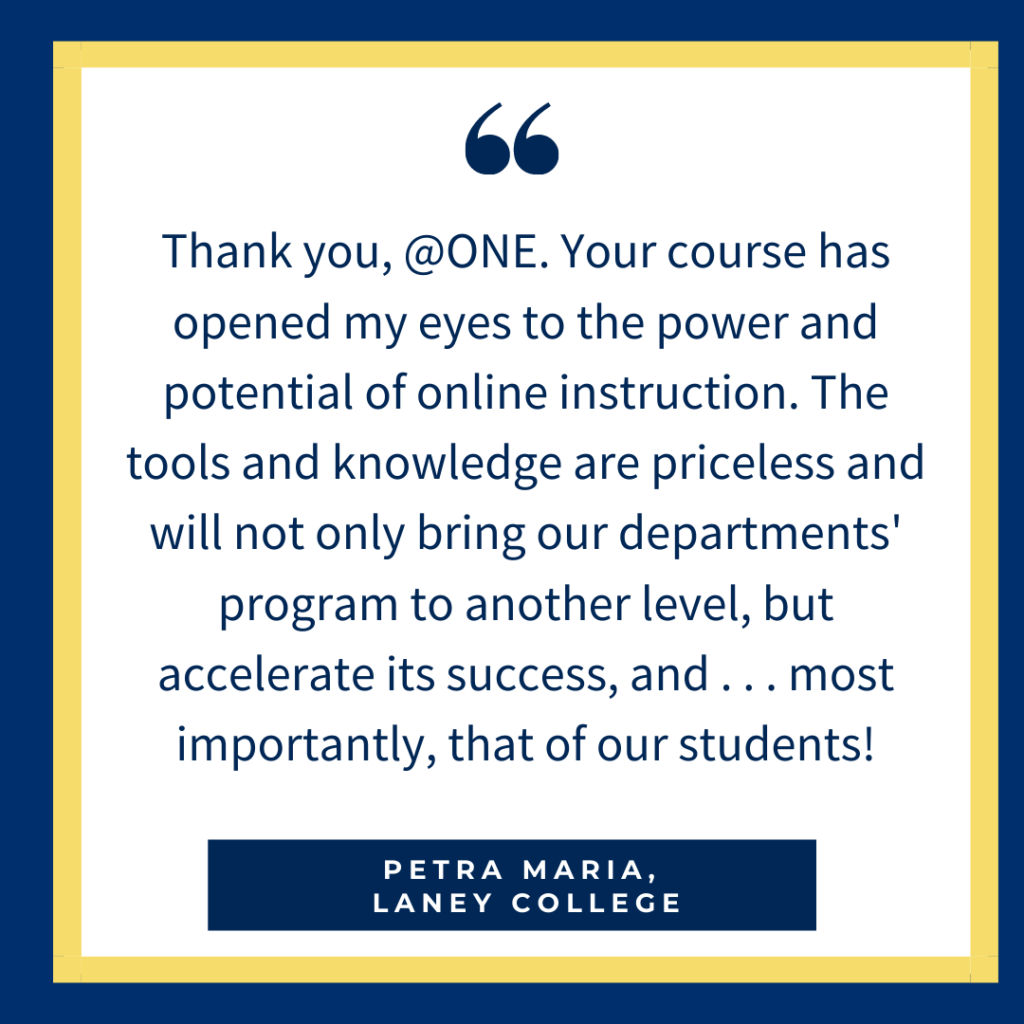
Professional development plays a critical role in improving the teaching and learning environments of the diverse students we serve in the California Community College system. To put it plainly: teaching matters — face-to-face and online. Nearly all (96%) of college students who entered a STEM major and chose to leave (either drop out of college or enter a different major) cited poor teaching and learning experiences as a reason (Seymour & Hunter, 2020). Black and Latinx STEM major “switchers” were more likely (88% to 79%) to cite the competitive culture of STEM courses as an influence in their decision to change majors. While STEM courses serve as a microcosm of inequity in U.S. higher education, the problems cited by STEM students are not restricted to those disciplines alone.
White and Asian students comprise less than 30% of the roughly 2.1 million students served by California community colleges. However, they are most likely to succeed in our courses, regardless of modality. Improving teaching and learning is an opportunity to advance equity in California. Our mindsets about race and ethnicity; knowledge about and appreciation for the rich, varied experiences our students bring to our classes; and our understanding of how to apply equitable teaching practices in our courses on-campus and online are integral to improving the lives of our students, the diversity of our state’s workforce, and the future of our country.
Connecting PD with Equity at the College Level
For decades, online courses have increased access to college for Black, Latinx, and Indigenous students, and now they have also proven to be the resilient backbone of higher education. As we reflect on the past difficult six months of unexpected disruption brought on by COVID-19 and piqued racial injustice in our communities and across the country, I suspect that each educator reading these words can recognize why continuously improving our teaching and learning practices and being compensated for one’s time are so vital.
From my experiences, many faculty, particularly those who are part-time, can be unaware for years, even decades, about how or if professional development can be used to increase their salary. Sierra College, driven by a systemic effort to improve equity, has made efforts to help faculty navigate this process. One of the changes Sierra made was to get the low-cost online professional development courses offered through @ONE and CVC-OEI and funded by the CCC Chancellor’s Office pre-approved by their Faculty Employees Reclassification Committee (FERC) and create a clear list of those courses, along with their locally-offered workshops and other off-campus opportunities.
@ONE and You

@ONE’s nationally recognized online professional development courses serve the needs of thousands of CCC faculty and staff each year. They are facilitated by CCC educators; model and foster Culturally Responsive Teaching pedagogy, accessibility, and Universal Design for Learning principles; and are available to all CCC faculty and staff at a low cost. @ONE courses can be taken a la carte or stacked to earn a certificate in Online Teaching & Design.
Many colleges in our system include @ONE courses in their locally-approved online teaching preparation process. Check with your college’s professional development coordinator or distance education coordinator to learn more. If you have a story to share about how @ONE helped improve your teaching, we’d love to hear from you in a comment below!
References:
Riegle-Crumb, C., King, B., and Irizarry, Y. (2019). Does STEM stand out? Examining racial/ethnic gaps in persistence across postsecondary fields. Educ. Res. 48, 133-144.
Seymour, E. & Hunter, E. B. (Eds.). (2020). Talking about leaving revisited: Persistence, relocation, and loss in undergraduate STEM education. Springer.
